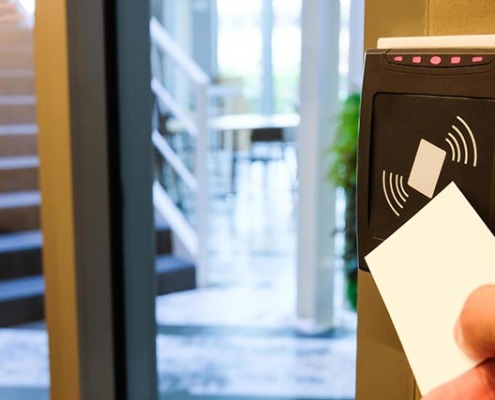Business Security: Protecting Your Premises with Access Control
 In an era where security threats are increasingly sophisticated and unpredictable, the urgency for businesses to adopt robust security measures has never been greater. Access control systems stand at the forefront of this, offering an effective solution to protecting a company’s physical and digital thresholds.
In an era where security threats are increasingly sophisticated and unpredictable, the urgency for businesses to adopt robust security measures has never been greater. Access control systems stand at the forefront of this, offering an effective solution to protecting a company’s physical and digital thresholds.
With advancements in technology propelling the industry forward, the landscape of access control is witnessing a remarkable evolution. This article explores the cutting-edge access control technologies that are setting new standards in business security and how access control installers can help businesses safeguard their premises.
Article Summary:
- The Rise of Access Control Systems
- Understanding Access Control: Basics and Benefits
- Types of Access Control Systems Available
- How to Choose the Right Access Control System for Your Business
- Integration with Other Security Measures
- Access Control Systems in Appleton
1. The Rise of Access Control Systems
Access control systems have emerged as a game-changing solution in the security landscape, offering businesses multiple layers of protection against unauthorized entry. With traditional physical security measures like locks and keys proving to be insufficient, access control has become an essential component for safeguarding business premises and confidential data.
The rise of cloud technology, coupled with increasing cyber threats, has also made it imperative for businesses to have robust access control systems in place. With access control, companies can effectively manage and monitor who has access to their premises or sensitive data, reducing the risk of breaches and ensuring compliance with privacy regulations.
2. Understanding Access Control: Basics and Benefits
At its core, access control is a system designed to grant or deny access based on the identification of individuals, effectively determining who can enter a specific area and when. This security offering goes beyond traditional lock-and-key mechanisms by integrating technology that enhances both safety and operational efficiency.
There are many advantages, aside from significantly bolstering security by minimizing unauthorized access, these systems streamline operations through automated management, thereby eliminating the cumbersome need for manual key distribution. Furthermore, access control systems extend benefits such as real-time monitoring and centralized control, providing businesses with oversight and flexibility in securing their premises.
3. Types of Access Control Systems Available
There are many access control systems available in the market, including:
- Mandatory Access Control (MAC): A highly secure system where access permissions are regulated by a central authority, making it suitable for environments requiring stringent security measures. This system is often used in military and government facilities where security levels are paramount.
- Discretionary Access Control (DAC): Offers flexibility by allowing resource owners to make decisions on who can have access. This model is adaptable and is typically employed in environments where the need for security is balanced with the need for user convenience like small businesses.
- Role-Based Access Control (RBAC): Permissions are assigned to roles rather than individual users, simplifying the management of user accesses based on their job functions. This system is widely used in corporate settings to streamline access controls and improve efficiency.
- Cloud-Based Systems: These systems offer remote management capabilities, allowing administrators to control and modify access permissions via the cloud. This model is ideal for businesses looking for scalable, flexible security solutions that can be managed from any location.
- Network Systems: Network-based access control systems use a network to connect and manage access points. They are suitable for businesses that need a centralized system to control access across multiple locations or large premises.
4. How to Choose the Right Access Control System for Your Business
When considering the right access control system for your business, follow these important steps:
- Assess Your Security Needs: Start by evaluating the level of security your business requires. Consider factors such as the sensitivity of the data or assets you are protecting and any specific threats your industry might face. This assessment will guide you in selecting a system that appropriately meets those needs.
- Consider the Size of Your Organization: The size of your organization plays a crucial role in selecting an access control system. Larger organizations may require more comprehensive systems with advanced features such as biometric scanners, while smaller businesses might find simpler, less expensive systems sufficient.
- Evaluate System Scalability: Choose a system that can grow with your business. Scalability is essential for ensuring that your access control system can accommodate additional users, doors, and locations without significant upgrades or replacements.
- Ease of Use and Management: Opt for a system that is user-friendly and easy to manage. Systems that offer centralized management and remote access capabilities can simplify the administration of access permissions and monitoring.
- Integration Capabilities: Ensure the access control system can integrate seamlessly with other security systems you have in place, such as surveillance cameras or alarm systems. Integration enhances overall security and operational efficiency.
- Check for Customization Options: Look for systems that offer customization options to meet your specific security requirements. Customizable access levels, time restrictions, and location-specific access can help tailor the system to your unique operational needs.
By carefully considering these factors, businesses can select an access control system that not only enhances their security posture but also aligns with their operational needs and goals.
5. Integration with Other Security Measures
 The integration of access control systems with other security measures is paramount in creating a comprehensive and robust security framework for any business. By integrating access control with surveillance cameras, intrusion detection systems, and alarm systems, businesses can achieve a layered security approach that enhances overall protection.
The integration of access control systems with other security measures is paramount in creating a comprehensive and robust security framework for any business. By integrating access control with surveillance cameras, intrusion detection systems, and alarm systems, businesses can achieve a layered security approach that enhances overall protection.
For instance, the synchronization of access control and surveillance cameras allows for real-time monitoring and recording of entry points, providing valuable visual verification in the event of an incident. Additionally, integrating access control with alarm systems ensures that any unauthorized access attempts trigger immediate alerts, enabling swift response to potential security breaches.
6. Access Control Systems in Green Bay
Green Bay, Wisconsin, is home to a wide range of businesses, from small startups to large corporations. With the increasing reliance on digital technologies in business operations and the growing concern for cyber threats, access control systems are becoming an essential aspect of security in every city, including Appleton and the Green Bay area.
For the best in Green Bay access control, call the experts at RanderCom. RanderCom offers a variety of access control solutions to meet the unique needs of businesses. Our team of experts provides consultation, installation, and ongoing support for access control systems, ensuring businesses have optimal security measures in place at all times. To get started securing your business, contact RanderCom today.
By Dylan Esterling, Owner of RanderCom
Dylan Esterling is the proud owner of RanderCom, serving Appleton, Green Bay, and communities across Wisconsin. At RanderCom, Dylan and his team offer comprehensive small-business technology solutions. Services include the sales and installation of phone systems, surveillance systems, access control systems, paging & intercom systems, voice & data services, data cabling & wiring, and IT network equipment. With years of experience in installing business phone systems and other systems, you can trust RanderCom to meet your small business tech needs. Contact us today!




